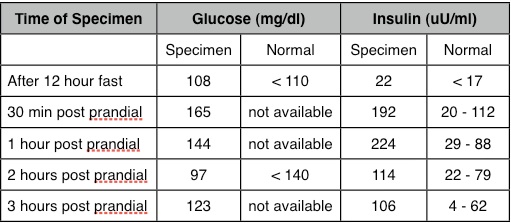Insulin test is conducted to measure the amount of insulin levels in the blood.
Here are some of the frequently asked questions about the insulin test.
What is Insulin?
Insulin is a very fatal hormone in human body. Beta cells in the pancreas produce a peptide hormone called Insulin. This hormone is a response for the intake of carbohydrates in food. Insulin is responsible for transfer of sugars and carbohydrates from blood to the cells in human body. The cells make use of these sugars to generate energy.
Insulin fails to work properly if there is an excessive intake of carbohydrates. Improper functioning of insulin leads to bad transfer of glucose to the blood cells. This leads to many unfavorable conditions like nerve damage, cardiovascular diseases, kidney problems, and Diabetes.
What is insulin test?
As mentioned above, insulin tests the quantities of insulin in your blood. When a person is making insufficient amounts of insulin, it leads to starving of blood cells. At the same time, if he makes excessive amounts of insulin, it leads to the formation of insulin tumors called insulinoma. Generally, doctors prescribe insulin test combined with glucose tolerance test to identify the levels of glucose and insulin in the blood.
When do you need to order an insulin test?
Insulin tests are prescribed for ‘n’ number of reasons. If a person shows any kind of symptoms relating to blood glucose levels, insulin test is probably the first one prescribed by his physician. The highly significant reason for insulin test is to evaluate or diagnose hyperglycemia (low blood sugar). Hyperglycemia can be caused by insulinoma which is caused by excessive amounts of insulin. Some of the symptoms of hyperglycemia are mentioned below.
- Unusual hunger
- Sweating
- Confusion
- Palpitations
- Dizziness
- Fainting
- Blurred vision
- Irritability
- Pale skin
- Shaky feeling
- Headaches
- Tingling of skin
- Concentration
- Rapid heartbeat
- Nervousness
- Mood changes
In some cases, due to the negligence of these symptoms the blood sugar may fall more rapidly and can cause fainting, coma or seizures.
These are the usual symptoms of low blood sugar levels. But, there are many other conditions which are caused by low blood sugar. Insulin test will be usually prescribed if these symptoms are identified. In some suspicions cases, insulin tests are also prescribed to the patients to check out the insulin resistance.
An inability to respond to the insulin hormone is called insulin resistance. Insulin resistance leads to a chronic disease called hyperinsulinemia which is caused by high blood sugar levels. So this includes people with pre-diabetes, metabolic syndrome, polycystic ovarian syndrome (PCOS), type 2 diabetes or heart diseases.
Physicians also order insulin test after the treatment of insulinoma to check out the insulin levels. Insulinoma patients may need to go for insulin tests periodically.
Patients who had undergone islet cell transplant may need to go for insulin tests regularly to check out their insulin producing capacities.
How do they test your insulin?
Your physician instructs you regarding the preparation for test. Your physician may suggest you to temporarily discontinue the ongoing medications. He may also advise you to fast before appearing to insulin test.
Like any blood test is done, blood is drawn from the vein from the back side of your hand or the inside portion of the elbow. Antiseptic is as a germ killing agent after the blood is drawn. Elastic band or a band aid is wrapped around the elbow or arm or wherever the blood is taken from. Elastic band helps to add extra pressure around the area, so that the vein swells to accumulate lots of blood.
Needle is gently inserted into the most swollen vein by the insulin test conductor. Airtight tubes or vials are used to collect the blood from the syringe. Elastic band will be removed off from your arm/elbow once the blood is collected. The puncture is gently rubbed to resist the bleeding if any.
In case of young children or infants, they use a sharply pointed tool known as “Lancet” for puncturing the skin to make it bleed. Blood is collected into a tube which is made out of glass known as “Pipette”.
How to analyze the results of insulin test?
Your doctor analyzes the insulin test results much better than anyone. However, the normal ranges of insulin under fasting ranges from 5-20 mcU/mL. Different laboratories produce different results with insulin tests with only slight changes. Lower insulin than the normal ranges may specify diabetes type 2 or type 1.
Higher insulin levels than normal ranges may specify any of these.
- Obesity
- Generation of excessive insulin
- Diabetes mellitus type 2
- Hyperglycemia
- Insulinoma
- Galactose or fructose intolerance
- Acromegaly
- Insulin resistance
- Cushing syndrome (related to fluctuations of cortisol levels)
What are the side effects or risks of insulin test?
Generally, the blood can be drawn easily from most of the people during insulin test. However in some cases, collecting a blood sample can be troublesome. Arteries and veins vary in sizes among different patients.
Some of the risks which are associated with insulin tests are mentioned below.
- Skin infections which are caused because of puncturing the skin
- Excessive bleeding
- Feeling of dizziness or fainting
- Hematoma (causes blood lumps)
In general cases, Insulin test under the supervision of a physician is almost riskless.
How much does it cost?
Insulin is a very affordable test. The costs may vary from laboratories to laboratories. If you are from India, check this out to know the costs of insulin tests in different cities.



excellent
Thanx 4 advoice
Interested in knowing.